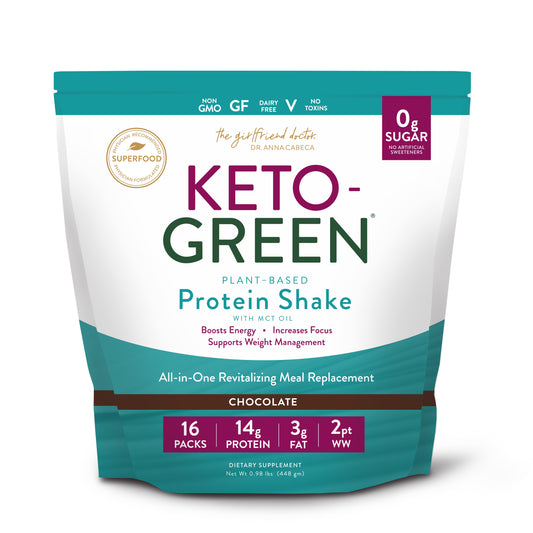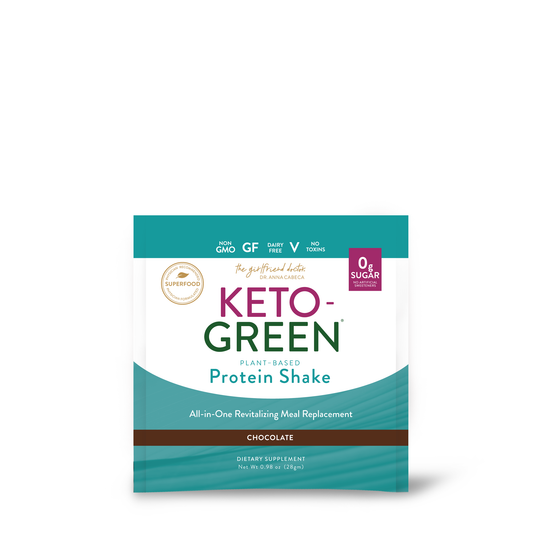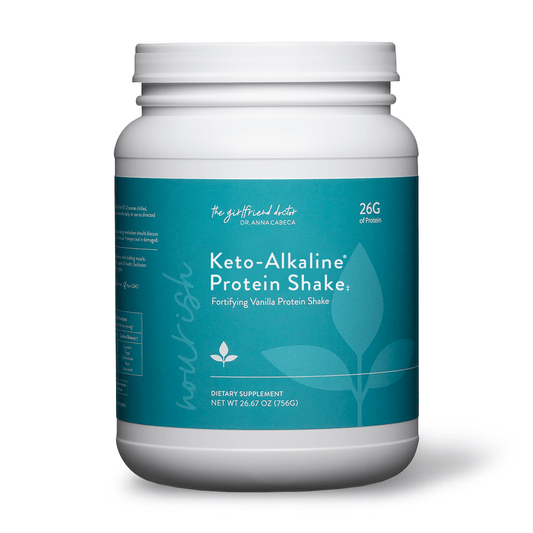Brain fog – it’s that thick cloud of confusion that impairs your concentration and your ability to remember things. I know because I’ve had it. I’d walk into a room, and think “I came in here for a reason. What was it?” The first time it hit me, I was convinced something sinister was in play.
But it wasn’t. I was menopausal at the time, so I figured it had to do with hormonal swings. Still, brain fog was an unexpected, scary thing. We know to anticipate hot flashes and night sweats around menopause, but memory loss? It’s a symptom that ambushes us, unaware. That’s why I’d find it so disconcerting to hear from my women patients that they thought they had dementia, a brain tumor, or severe mental illness… and what’s worse, just felt that they had to live with these symptoms.
Alas - not to worry! It is your hormones, and you can fix them with my Keto-Green 16 diet. Featured in my new book Keto-Green 16, the diet emphasizes clean proteins, low-carbohydrate alkaline veggies (especially greens), and healthy fats such as nuts, avocadoes, olive oil, MCT oil, and coconut oil. When you follow this 16-day, rapid weight-loss plan, expect to lose up to a pound a day, pare inches off your waist, and feel wonderful.
There’s more to it than weight loss, though: Keto-Green 16 will also clear away brain fog and restore your memory to laser-like recall – for two science-backed reasons.
Your Brain on Keto
Reason number one: On a ketogenic diet, the brain is fueled mainly by “ketones.” These are produced in the liver when carb intake is very low, as they are on a keto diet. Keto-Green 16 keeps carbohydrates low - under 40 grams daily.
But hold on: Maybe you’ve heard that your brain requires at least 130 grams of carbs a day to function properly. Well, guess what? That is one of the most common myths about keto and low-carb diets. In fact, a report by the U.S. Institute of Medicine’s Food and Nutrition Board states: "The lower limit of dietary carbohydrates compatible with life apparently is zero, provided that adequate amounts of protein and fat are consumed."
The brain does run on glucose, even from a tiny amount of carbs. The best source of that glucose is from a diet rich in low-carb vegetables and fruit—like the Keto-Green diet. The brain, however, hates glucose obtained from refined sugar. This kind of sugar is known to ruin cognitive function and memory.
In fact, if you’re eating a lot of sugar and simple carbohydrates, you’re at greater risk of developing “cerebral amyloid burden,” observed in people with Alzheimer’s disease. This happens when corrupted proteins called amyloids gang up in the brain, forming plaques that kill brain cells. Happily, you won’t be eating any brain-destructive sugar on the Keto-Green 16 plan! On it, you break up with sugar for good.
Let me add that glucose utilization in the brain depends, in a large part, on estrogen. So as estrogen levels begin to decline, this main fuel source strangulates (another reason for the brain fog and memory issues).
Ketones to the rescue! The brain can also run on ketones as a back-up fuel source. They are shuttled to the brain to keep it happy, satisfied, and operating at maximum capacity.
Compared to glucose, ketones are an ideal energy source for the brain. They supply more energy per unit of oxygen consumed by the brain, provide that energy at a faster rate, help regulate weight-control hormones like leptin and insulin, and reduce free radicals associated with brain inflammation. The net effect of ketone bodies on the brain is sharper thinking and prevention of neurological disorders and conditions. We know this from studies of older adults at risk of dementia. In research, they’ve shown improvement in memory after following a very-low-carb, keto-type diet.

In 2019, I conducted two studies to test the Keto-Green 16 diet. Across the board, nearly everyone in my studies reported sharper mental focus, clearer thinking, and vanishing brain fog. The shift in fuel source from glucose to ketones is especially essential if your hormones are fluctuating and your memory feels like it’s failing.
My combination of keto-alkaline eating has a significant influence on insulin – a major hormone. Insulin affects many other hormones, including estrogen, progesterone, and testosterone. When it is unbalanced, other hormones go out of whack too.
Because my Keto-Green 16 diet lowers carbs, it also balances insulin and makes your body more receptive to using the hormone properly. When this happens, all sorts of metabolic miracles kick in, from protecting your heart, reducing your risk for osteoporosis, losing weight, to conquering menopause symptoms.
One of the other big benefits has to do with the brain. Research has found that when people start showing mental and intellectual deficits, their bodies aren’t processing insulin normally. But when you live the Keto-Green way, you can potentially fend off these problems, because properly regulated insulin plays such an important role in healthy brain function, especially in learning and memory.
Your Brain on Greens
Reason number two: My Keto-Green 16 diet is high in leafy greens such as spinach, kale, collards, beet greens, chard, bok choy, and lettuces of all types. Everyone knows that eating more of these foods is good for your health. But proof is mounting that increased consumption of veggies like spinach and kale can improve memory and overall brain health.
In one study, researchers at Rush University Medical Center in Chicago found that eating just one serving (1/2 cup cooked or one cup raw) of green leafy vegetables a day may significantly reduce memory loss, improve thinking skills, and better preserve brain power. The results further suggested that regularly eating about 1.3 servings of leafy greens a day can turn back the brain-aging clock by 11 years! The study results were published in the December 20, 2017 issue of Neurology, the medical journal of the American Academy of Neurology.
Why are greens so brain-protective? Researchers assert that they are packed with lutein, which reduces inflammation on the brain, and folate, which reduces amyloid burden in the brain, the hallmark of Alzheimer’s disease I mentioned above. Leafy greens are clearly a key component in preventing memory and mental decline.
On my Keto-Green 16 plan, you’ll discover that it’s easy to work leafy greens into your daily diet. You can add them to my Keto-Green shakes and smoothies, sauté them as side dishes, pump up your salads, or incorporate them into soups and stews. And if you don’t like green vegetables (we need to talk), try my Keto-Green Meal Replacement powder or my Keto-Alkaline Protein powder. Both contain concentrated greens that you can mix up in a shake or smoothie – and get your greens in a glass.
Your brain will love it when you feed it the Keto-Green way. It loves running on ketones, and it loves the nutrition from leafy greens. Go Keto-Green, and you’ll turn back your brain-aging clock, be mentally energized, and feel spiritually alive.

P.S. - Don’t forget to get your copy of Keto-Green 16!
Keto-Green 16 comes on the heels of my best selling book, The Hormone Fix! This book is an innovative 16-day plan that combines the fat-burning benefits of a ketogenic diet with the brain-clearing and keto-flu protection of alkaline food.
Snag your copy HERE!







